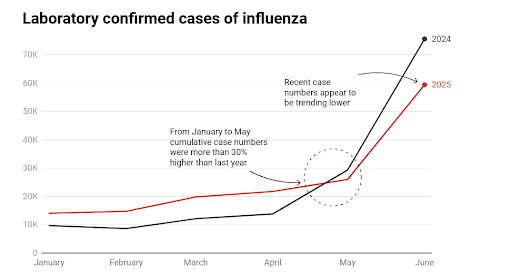Table of Contents
As temperatures drop, respiratory viruses are on the rise. If you’ve recently battled a sore throat, runny nose, persistent cough, or even fever—you’re far from alone. Hospitals and aged care facilities nationwide are feeling the strain.
Hospitals Under Pressure
Last week, several Queensland hospitals paused non-urgent surgeries due to rising cases of influenza and COVID-19. At the same time, COVID outbreaks have been reported in over 200 aged care centres across Australia.
What’s Circulating This Season?
COVID-19
- June surge: Nearly 32,350 COVID cases were reported—approaching last year’s June figure of 45,634.
- Undercounting likely: Testing rates have dropped compared to early pandemic years.
- Current variant: NB.1.8.1 (“Nimbus”), a descendant of JN.1, has driven the latest winter wave.
- Symptoms: Classic cold-like signs plus particular painful sore throats as well as nausea, and diarrhoea.
- Risk groups: Older adults and those with chronic conditions face severe illness risks.
- Vaccination: Boosters target JN.1 and are effective against Nimbus and related strains like “Stratus” (XFG).
- Who should boost: Annual boosters are widely available; those 75+ are encouraged to get one every six months.
- Antivirals: Offered to people 70+ and at-risk younger Australians who test positive.

Table: Source COVID-19 vaccine advice and recommendations | Australian Government Department of Health, Disability and Ageing
Influenza (Flu)
- Severity: The 2025 flu season has hit hard, with January–May cases up 30% over last year, the highest first quarter influenza case numbers since the end of the COVID pandemic.

Table: Source Dashboard · NINDSS Portal
- Symptoms: High fever, muscle aches, fatigue, sore throat, and congestion.
- Who’s most vulnerable: Elderly, young children, and pregnant people.
- Vaccination access:
- Free for children aged 6 months to 4 years, people 65+, pregnant women, and high-risk groups.
- Free in Queensland and WA for everyone aged 6 months+; other regions may charge up to A$30.
RSV (Respiratory Syncytial Virus)
- Reporting: Only tracked since 2021, making long-term comparisons tricky.
- Case count: June 2025 saw 27,243 cases—on par with June 2024. The peak may have just passed.
- Symptoms: Similar to a cold, but can escalate to bronchiolitis and pneumonia.
- Who’s at risk: Infants, elderly, and those with chronic conditions.
- Treatment & prevention:
- Free vaccine now available for pregnant women to protect newborns up to six months.
- Monoclonal antibody injection offered for at-risk children under two.
- Older adults can access 2 vaccines brands recommended for:
- Everyone aged 75+
- At-risk individuals 60+
- Aboriginal and Torres Strait Islander people 60+
- Note: These adult vaccines cost ~$300 and aren’t subsidised (yet). Protection lasts at least 3 years.
The Common Cold
- Causes: The common cold can be caused by over 200 virus types—mostly rhinoviruses, but also coronaviruses and others.
- Symptoms: Sneezing, congestion, sore throat, fatigue, mild fever.
- Frequency: Children average 6–8 colds per year; adults get 2–4.
- Treatment: Rest, hydration, and OTC remedies. A universal vaccine is still elusive due to viral diversity.
How to Stay Safe
Even minor viruses can cause major disruptions. To protect yourself and others:
- Maintain good hygiene practices.
- Cover your coughs and teach kids to do the same.
- Wear a high-quality mask if you’re at increased risk.
- Rest at home when unwell.
Rapid “panel tests” that detect influenza A/B, COVID, and RSV are now available for home use—handy if you’re feeling off this winter.
By taking simple precautions, we can help reduce pressure on healthcare systems and safeguard vulnerable communities.
It’s easy to get an assessment from the comfort of one’s home using MediLeave – a leading Telehealth platform in Australia. Using MediLeave’s Telehealth platform, you can speak to a doctor on demand, and if deemed suitable for your health issue, the doctor can provide a medical certificate online and instant scripts (if appropriate) when you have a cold and flu symptoms.
📱 Visit our website: www.medileave.com.au
The content provided is for general informational purposes only and does not constitute medical advice, nor is it a substitute for professional medical consultation. If you are experiencing symptoms or have concerns related to vaginal discharge or reproductive health, please seek advice from a qualified healthcare professional. The views or recommendations expressed in this article and any linked resources do not necessarily reflect those of MediLeave or its affiliates.
